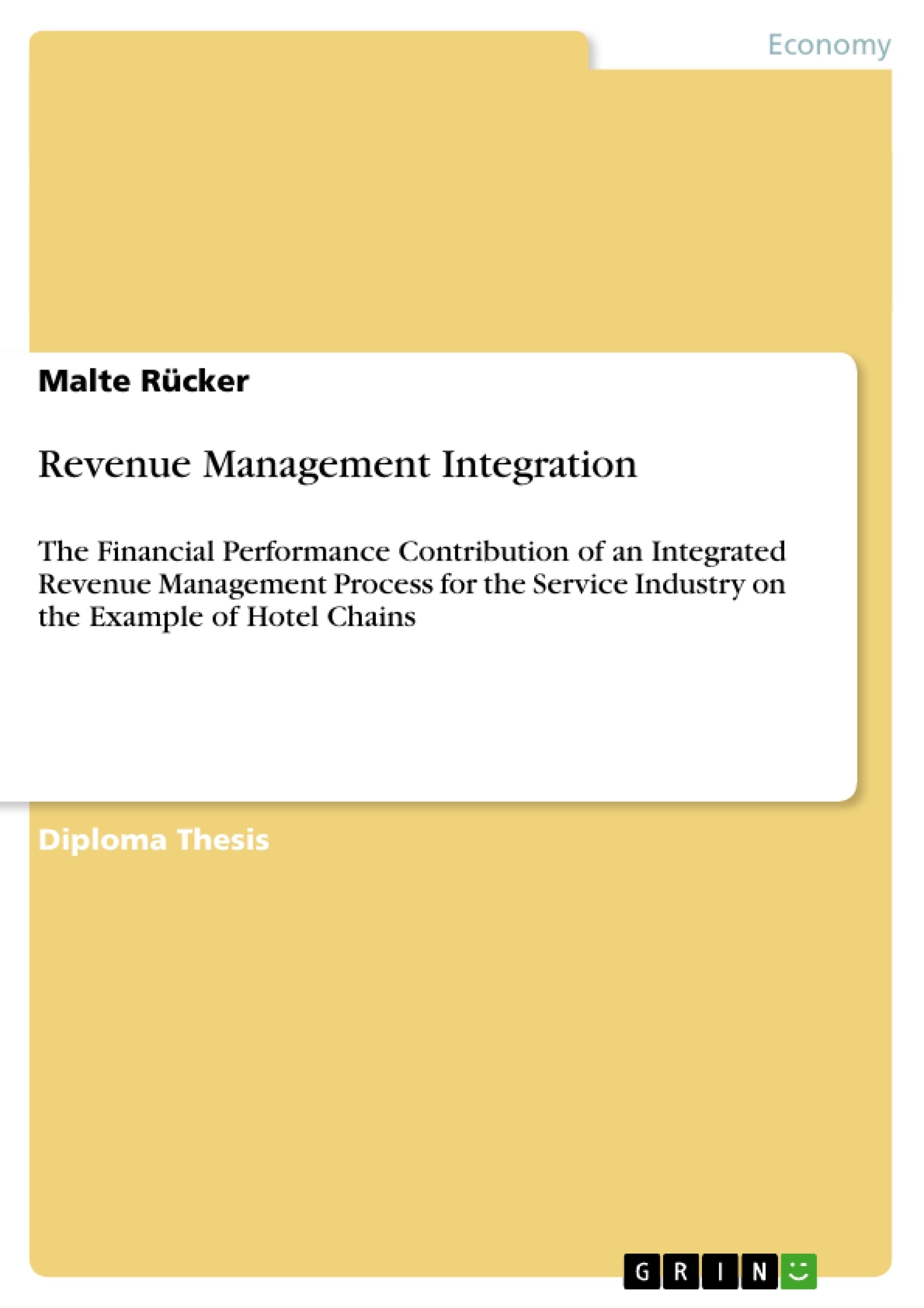The diploma thesis assesses the opportunity to implement an integrated approach to revenue management in order to meet the challenges of the competitive tourism environment, which are particularly stemming from the increasing importance of the internet. It is proposed that effective and efficient coordination of the disciplines of revenue management, marketing, sales and e-commerce leads to Revenue Management Integration (RMI), which has a positive effect on financial performance and competitiveness. The thesis aims at identifying key linkages among the disciplines and creates a guideline of how the integration may be achieved. Using multivariate regression, it is tested with 30 hotels, affiliated to eight of the largest hotel chains in Germany, whether Revenue Management Integration is positively related to financial performance. The study showed that integrated revenue management is positively related to RevPAR performance in hotel properties, while the relationship to other profitability measures, such as Return on Equity (ROE) and Operating Profit Margin (OPM) did not yield clear results.
Inhaltsverzeichnis (Table of Contents)
- 1. INTRODUCTION
- 1.1. RESEARCH QUESTIONS
- 1.2. RESEARCH CONTRIBUTION
- 1.3. GENERAL OBJECTIVE
- 1.4. SPECIFIC OBJECTIVES
- 1.5. HYPOTHESES
- 1.6. RESEARCH DESIGN
- 1.7. RESEARCH METHODOLOGY
- 1.7.1. Literature Review
- 1.7.2. Structured Interviews
- 1.7.3. Multivariate Regression Analysis
- 1.7.4. Secondary Analysis
- 1.7.5. Sampling Method
- 2. IMPACT OF THE MODERN TOURISM VALUE NET ON TOURISM INDUSTRY STRUCTURE
- 2.1. THE MODERN TOURISM VALUE NET
- 2.2. INDUSTRY ANALYSIS ALONG THE FIVE COMPETITIVE FORCES
- 3. REVENUE MANAGEMENT INTEGRATION (RMI)
- 3.1. INTEGRATED REVENUE MANAGEMENT AS A COMPETITIVE ADVANTAGE
- 3.2. REENGINEERING AN ORGANIZATION FOR REVENUE MANAGEMENT INTEGRATION (RMI)
- 4. REVENUE MANAGEMENT PERSPECTIVE
- 4.1. EMSR METHOD AND DEMAND FORECASTING
- 4.2. PRICING AND PRICE ELASTICITIES
- 5. MARKETING PERSPECTIVE
- 5.1. CREATING AND MAINTAINING CUSTOMER VALUE
- 5.2. BLUE OCEAN STRATEGY AND VALUE INNOVATION
- 5.3. CUSTOMER SEGMENTATION AND DIFFERENTIAL PRICING
- 5.4. INTEGRATING CUSTOMER RELATIONSHIP MANAGEMENT
- 5.5. WILLINGNESS-TO-PAY FOR CUSTOMIZED PRICING
- 6. SALES PERSPECTIVE
- 6.1. PRODUCT PORTFOLIO OPTIMIZATION
- 6.2. COORDINATION AND GOAL ALIGNMENT
- 6.3. DYNAMIC PRICES FOR CORPORATE KEY ACCOUNTS
- 6.4. SALES AND MARKETING
- 7. E-COMMERCE PERSPECTIVE
- 7.1. CHANNEL ANALYSIS AND SELECTION
- 7.2. DYNAMIC PRICING IN ONLINE DISTRIBUTION
- 7.3. ACTIVE CHANNEL MANAGEMENT
- 8. SHORT SUMMARY OF THE LITERATURE REVIEW
- 9. THE REVENUE MANAGEMENT INTEGRATION (RMI) STUDY
- 9.1. SAMPLE SELECTION
- 9.2. FINANCIAL PERFORMANCE MEASURES
- 9.3. INDIVIDUAL AND AGGREGATE VARIABLES
- 9.4. RESEARCH QUESTIONNAIRE
- 9.5. MULTIVARIATE REGRESSION FOR STATISTICAL ANALYSIS
- 9.6. ADDITIONAL CONTROL VARIABLES
- 10. DATA ANALYSIS AND RESULTS
- 10.1. MULTIPLE REGRESSION ANALYSIS WITH REVPAR
- 10.2. REDUCING THE MULTIPLE REGRESSION MODEL
- 10.3. ANALYSIS OF REDUCED MODEL RESULTS
- 10.4. COMPONENT REVENUE MANAGEMENT INTEGRATION (RMI) ANALYSIS
- 10.5. MULTIPLE REGRESSION WITH ROE
- 10.6. MULTIPLE REGRESSION WITH OPM
- 11. LIMITATIONS OF STUDY AND FURTHER RESEARCH
Zielsetzung und Themenschwerpunkte (Objectives and Key Themes)
This diploma thesis investigates the impact of integrated revenue management on the financial performance of hotels in a competitive tourism market increasingly shaped by the internet. The primary objective is to identify key linkages between revenue management, marketing, sales, and e-commerce, outlining a guideline for successful integration. The study uses multivariate regression analysis to test the relationship between Revenue Management Integration (RMI) and financial performance using data from German hotels.
- The impact of the internet on the competitive tourism environment.
- The development and implementation of Revenue Management Integration (RMI).
- The relationship between RMI and key financial performance indicators (e.g., RevPAR).
- The integration of various disciplines (revenue management, marketing, sales, e-commerce).
- The creation of a practical guideline for implementing RMI in hotels.
Zusammenfassung der Kapitel (Chapter Summaries)
Chapter 1 introduces the research questions, objectives, and methodology. Chapter 2 analyzes the modern tourism value net and its impact on industry structure. Chapter 3 defines Revenue Management Integration (RMI) and its potential as a competitive advantage. Chapters 4, 5, 6, and 7 explore the perspectives of revenue management, marketing, sales, and e-commerce, respectively, within the context of RMI. Chapter 8 summarizes the literature review. Chapter 9 details the methodology of the empirical study, including sample selection and data collection. Further chapters (10 and beyond) are excluded to avoid revealing major conclusions or spoilers.
Schlüsselwörter (Keywords)
Revenue Management Integration (RMI), financial performance, RevPAR, competitive tourism environment, internet, marketing, sales, e-commerce, hotel industry, multivariate regression analysis.
Frequently Asked Questions
What is Revenue Management Integration (RMI)?
RMI is the effective and efficient coordination of revenue management, marketing, sales, and e-commerce to improve financial performance and competitiveness.
How does the internet impact hotel revenue management?
The internet has increased competition and changed industry structures, making integrated strategies across online channels essential for maintaining customer value.
What are the key findings of the RMI study?
The study found that integrated revenue management is positively related to RevPAR performance in hotels, although results for ROE and OPM were less clear.
Which hotel disciplines are involved in RMI?
Key disciplines include revenue management (forecasting/pricing), marketing (customer value), sales (portfolio optimization), and e-commerce (channel management).
What methodology was used in this research?
The thesis utilized a literature review, structured interviews, and multivariate regression analysis with data from 30 hotels in Germany.
- Quote paper
- Malte Rücker (Author), 2010, Revenue Management Integration, Munich, GRIN Verlag, https://www.grin.com/document/187243



